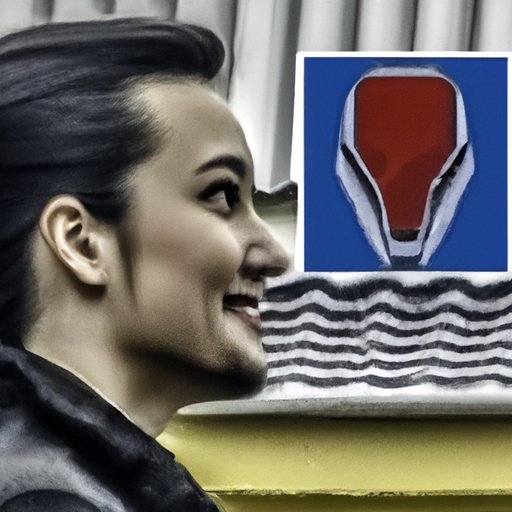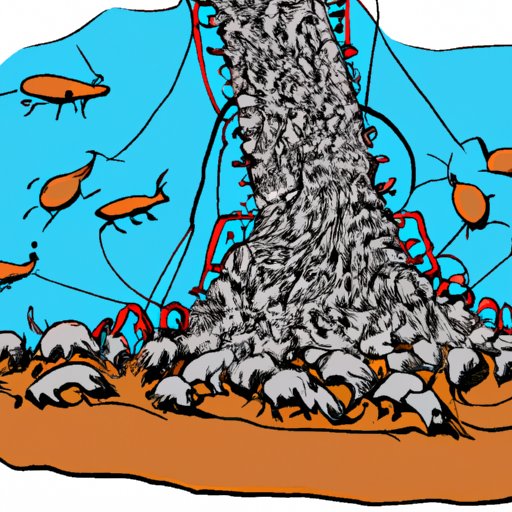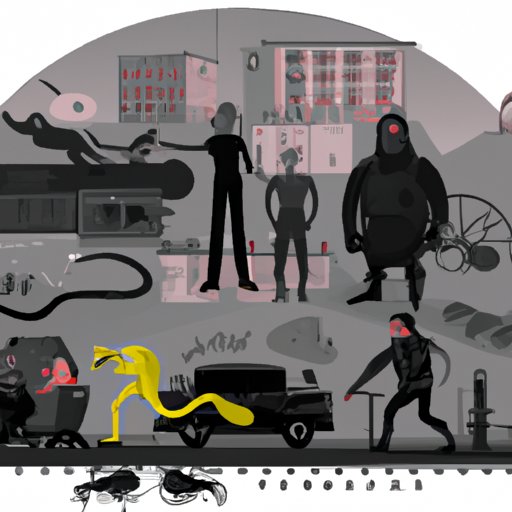Introduction
Parasite is a 2019 South Korean dark comedy-thriller film written and directed by Bong Joon-ho. The film follows the Kim family, who are living in poverty, as they scheme to become employed by the wealthy Park family. Parasite won numerous awards, including four Oscars for Best Picture, Best Director, Best International Feature Film, and Best Original Screenplay. It was also the first foreign language film to win the Academy Award for Best Picture.
This article aims to explore the themes, characters, cinematography, and soundtrack of Parasite in order to gain a deeper understanding of the film. By looking at each of these elements, we can gain insight into the film’s message and examine its impact on viewers.

Exploring the Themes of Parasite: A Film Analysis
At its core, Parasite is a story about social class inequality. Through its themes, the film examines the power dynamics between the rich and the poor, as well as the impact of money on relationships. These themes are explored throughout the film, allowing the audience to gain a better understanding of the world that the characters inhabit.
Social Class Inequality
One of the main themes of Parasite is the stark difference between the wealthy and the impoverished. This disparity is seen in the different lifestyles of the two families; the Parks live in a luxurious home with all the latest technology, while the Kims live in a cramped semi-basement apartment. This contrast serves to emphasize the divide between the two classes and the struggles faced by those in poverty.
The film also highlights the way in which social class affects people’s lives. The Kims are constantly struggling to make ends meet, while the Parks have little to worry about financially. This creates a sense of powerlessness among the Kims, as they are unable to escape their situation due to their lack of resources. The film illustrates how the wealthy are able to manipulate the poor to their own advantage, highlighting the injustices of social class inequality.
Power Dynamics in Relationships
The power dynamics between the two families are further explored in the film. The Parks are in a position of power, while the Kims are in a state of servitude. This is seen in the relationship between the two families, as the Parks are able to control the Kims through their wealth. This power imbalance creates a sense of tension between the two groups, as the Kims are constantly striving to gain the approval of the Parks in order to maintain their employment.
The film also shows how money can be used to manipulate relationships. The Parks use their wealth to control the Kims, which leads to the Kims becoming increasingly desperate to please them. This dynamic serves to highlight the impact of money on relationships, and how it can be used to exploit those in a vulnerable position.
The Impact of Money
The theme of money is explored throughout the film, as it serves as both a source of power and a tool for manipulation. The Parks are able to use their wealth to control the Kims, while the Kims are forced to resort to desperate measures in order to survive. This illustrates the power of money and how it can be used to manipulate and exploit those in a vulnerable position.
The film also shows how money can be used to buy happiness. The Parks are able to purchase whatever they desire, while the Kims are unable to afford even basic necessities. This serves to illustrate the power of money and how it can be used to improve one’s life, but also highlights the unequal distribution of wealth in society.

How Parasite Subverts Social Class Expectations
The film subverts traditional notions of social class by blurring the lines between rich and poor. Throughout the film, the Kims are able to infiltrate the Park household and blend in with the wealthy family. This serves to challenge the idea of an impenetrable barrier between the two classes, as the Kims are able to move freely between the two worlds.
The film also breaks down barriers between classes by showing how the two families can come together. Despite their differences, the two families develop a close bond over the course of the film. This serves to illustrate the potential for unity between the classes, and highlights the importance of empathy in bridging the gap between them.
The film culminates in an unexpected reversal of roles, as the Kims take control of the Park household. This serves to challenge traditional notions of social class, as the Kims are able to rise above their station and gain power over the wealthy family. This serves to illustrate how class divides can be overcome, and how those in a disadvantaged position can still achieve success.

Examining the Characters of Parasite and Their Impact on the Story
The characters of Parasite play an important role in the film, as they serve to illustrate the themes of the film. Each character has their own unique struggles and motivations, and their interactions with each other help to drive the plot forward.
Kim Ki-taek and His Family
Kim Ki-taek is the father of the Kim family, and serves as the protagonist of the film. He is a proud man who is desperate to provide for his family, and will do whatever it takes to ensure their survival. His determination to succeed serves to illustrate the lengths that those in poverty must go to in order to survive.
Ki-woo is the eldest son of the Kim family, and serves as the moral center of the film. He is determined to escape his family’s poverty and strives to create a better life for himself. His ambition serves to illustrate the potential for those in a disadvantaged position to rise above their station.
Park Dong-ik and His Family
Park Dong-ik is the patriarch of the Park family, and serves as the antagonist of the film. He is a wealthy businessman who is obsessed with maintaining his family’s status. His arrogance serves to illustrate the power of wealth and how it can be used to manipulate those in a vulnerable position.
Yeon-kyo is the matriarch of the Park family, and serves as the moral center of the film. She is a kind woman who is genuinely concerned for the wellbeing of her family. Her compassion serves to illustrate the potential for empathy between the classes, and how it can be used to bridge the gap between them.
Moon-gwang and Her Role in the Story
Moon-gwang is an elderly woman who serves as a catalyst for the events of the film. She is a former housekeeper for the Parks, and is the key to the Kims infiltrating the household. Her presence serves to illustrate the possibility of unity between the classes, and how those from different backgrounds can come together to achieve a common goal.
The Cinematography of Parasite: An In-Depth Look
The cinematography of Parasite serves to illustrate the themes of the film. The use of color, focus on details, and creation of a sense of foreboding all contribute to the overall effect of the film.
Use of Color
The cinematography of Parasite makes use of color to differentiate between the two classes. The Parks’ home is filled with bright, vibrant colors, while the Kims’ home is dull and drab. This serves to illustrate the stark contrast between the wealthy and the poor, and emphasizes the difference in their lifestyles.
Focus on Details
The film also makes use of close-up shots to draw attention to certain details. These details serve to emphasize the themes of the film and illustrate the power of money. For example, the viewer is shown the expensive items in the Park’s home, as well as the meager possessions of the Kims. This serves to illustrate the difference in their lifestyles, and how money can be used to manipulate relationships.
Creating a Sense of Foreboding
The cinematography of Parasite also serves to create a sense of foreboding. Throughout the film, the camera lingers on certain objects or moments, creating a feeling of impending doom. This serves to build suspense and keep the viewer on edge, as they anticipate the events that will unfold.
A Discussion of the Soundtrack in Parasite and Its Role in the Film
The soundtrack of Parasite is an integral part of the film, as it serves to create emotion and enhance the atmosphere. The music helps to create tension, evoke emotion, and build suspense. The choices of instrumentation, selection of songs, and use of sound effects all contribute to the overall effect of the film.
Use of Music to Create Emotion
The soundtrack of Parasite makes use of music to create emotion. The score is often tense and eerie, creating a sense of unease and dread. This serves to build suspense and intensify the emotions of the film, helping to keep the viewer engaged.
Choices of Instrumentation
The soundtrack also makes use of various instruments to create a distinct sound. Violins, cellos, and percussion are used to add texture and depth to the music. These instruments serve to create a sense of urgency and tension, heightening the emotions of the film.
Selection of Songs
The soundtrack also includes various songs, which serve to provide context for the film. These songs help to create a sense of atmosphere and evoke emotion in the viewer. They also serve to provide insight into the characters and their motivations, allowing the viewer to gain a better understanding of the story.
Conclusion
In conclusion, Parasite is a film that explores the themes of social class inequality, power dynamics in relationships, and the impact of money. Through its characters, cinematography, and soundtrack, the film is able to effectively illustrate these themes and create an emotional experience for the viewer. By examining each of these elements, we can gain a deeper understanding of the film and its message.
The film subverts traditional notions of social class by blurring the lines between rich and poor, and by breaking down barriers between classes. It also challenges the idea of an impenetrable barrier between the classes, illustrating how those in a disadvantaged position can still achieve success. Through its exploration of these themes, Parasite is able to create an engaging and thought-provoking experience for viewers.
Final Thoughts
Parasite is a powerful film that serves to illustrate the themes of social class inequality and the power of money. It is a thought-provoking film that encourages viewers to reflect on the inequalities of society and consider how they can make a difference. Through its characters, cinematography, and soundtrack, the film is able to create an engaging and emotionally charged experience for the viewer.
(Note: Is this article not meeting your expectations? Do you have knowledge or insights to share? Unlock new opportunities and expand your reach by joining our authors team. Click Registration to join us and share your expertise with our readers.)
